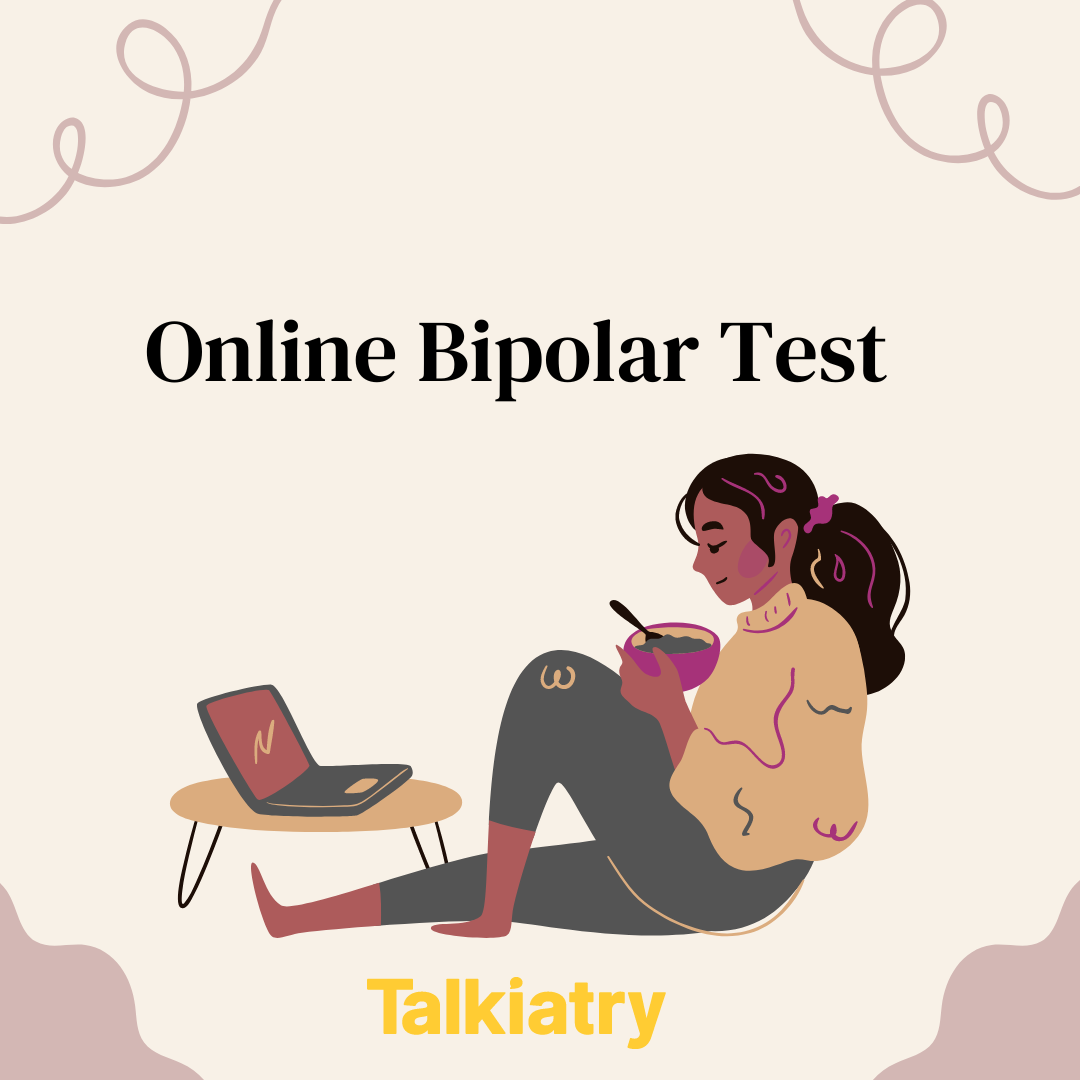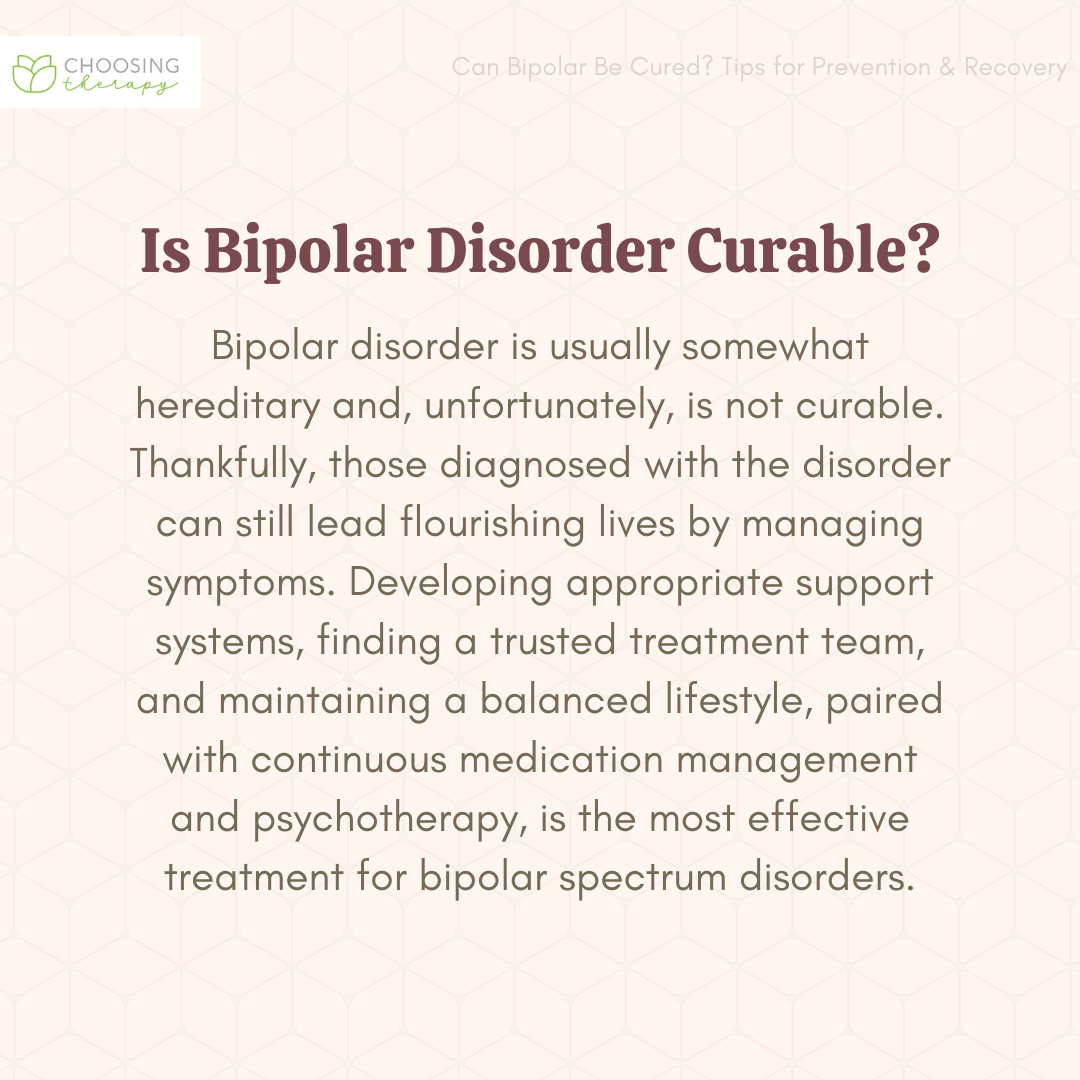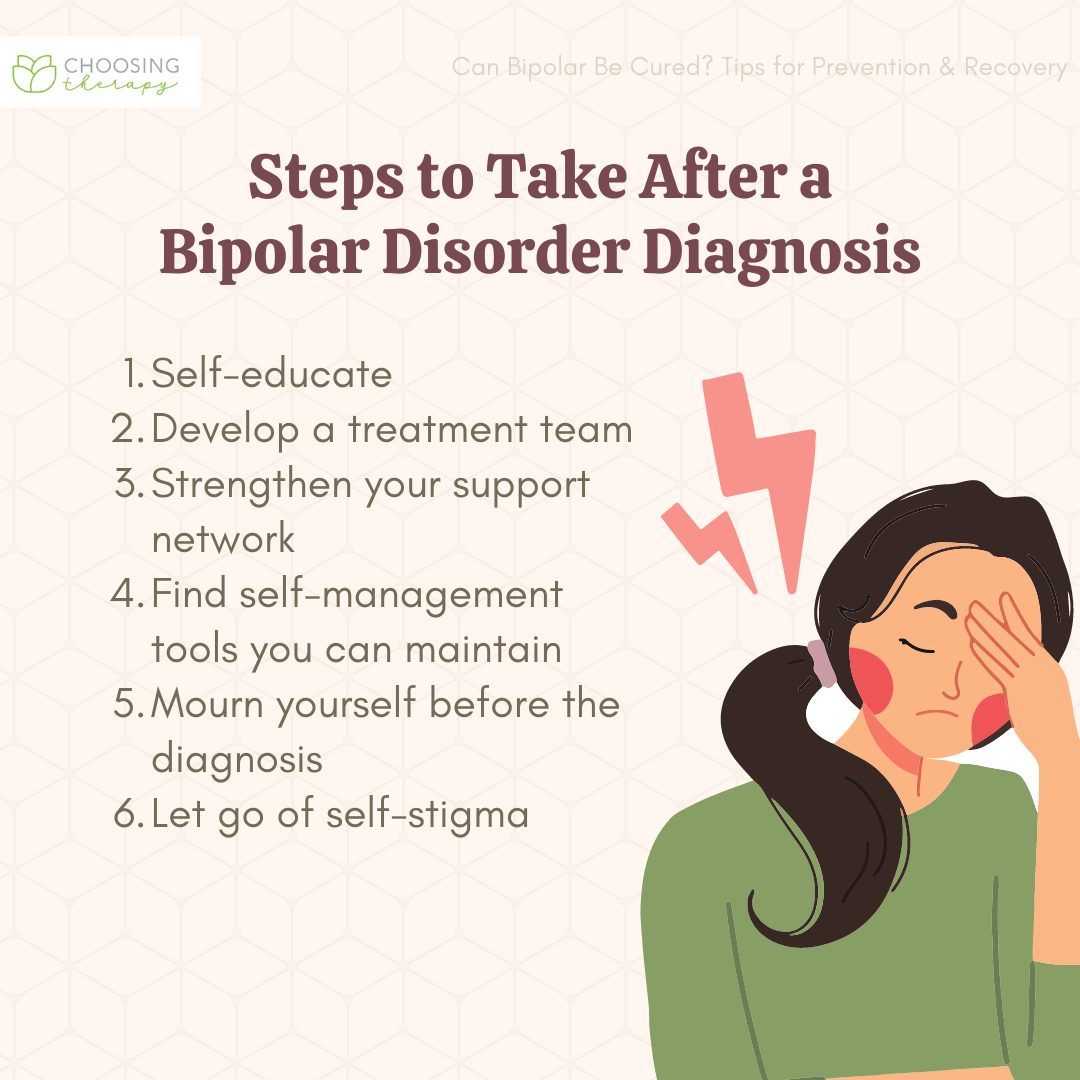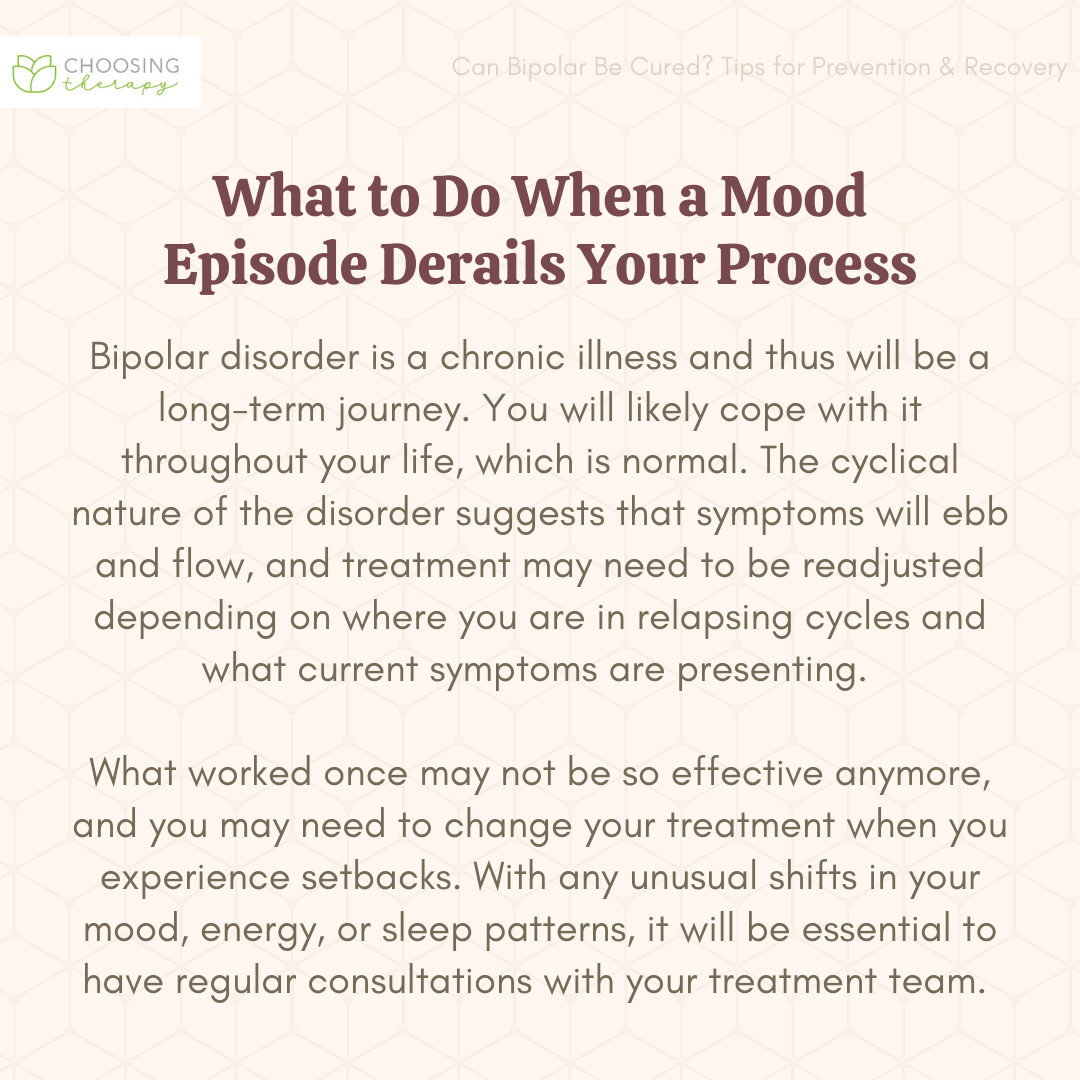Receiving a diagnosis of bipolar spectrum disorder for you or your loved one may feel disorienting and daunting. Although these disorders are chronic and cannot be cured, people can effectively manage symptoms. Comprehensive treatment, which includes medication, psychotherapy, and a balanced lifestyle, are critical factors in living with the disorder and achieving well-being.
Online Psychiatry Covered By Insurance
Talkiatry can match you with a real psychiatrist who takes your insurance and is seeing new patients. They’re in-network with major insurers and offer medication management. Get started with a short online assessment
What is Bipolar Disorder?
Bipolar disorder, previously called manic-depressive disorder, is characterized by mood and energy lability. People may shift from feeling very depressed to tremendously elated. During extreme mood episodes, cognitive distortions are common and may change how a person with bipolar disorder thinks.
Depressive episodes may lead people to experience:1, 2
- Inability to overcome feelings of hopelessness
- Suicidal ideation
- Negative thought patterns about their life, including negative self-talk and guilt
- Heightened states of pessimism that disqualify any positive event
- Magnification of the unpleasant experiences
- Physical symptoms such as changes in sleep or appetite, decreased energy and concentration
While in a bipolar state of mania, people may:3, 4
- View themselves in a grandiose manner (such as Delusions of Grandeur)
- They think they have extraordinary abilities and great ideas
- Racing thoughts and pressured speech
- Decreased need for sleep
- Sometimes experience bipolar psychosis with abnormal thinking and perception of reality
Bipolar disorder is cyclical in nature. These cycling episodes may vary in intensity and severity of symptoms between people and within the same person. Even more, some may experience rapid cycling bipolar disorder, which can significantly impact people’s ability to function in their daily life, make decisions, complete daily tasks, and interact with others if proper treatment isn’t taken.
Types of Bipolar Disorder
The presentation of bipolar disorder is complex and can be classified into several subtypes, such as bipolar I or bipolar II. Those in a manic phase may feel good during this period or not notice the symptoms as any concern as they don’t become extreme or destructive to their life. This factor can lead people to seek help mostly during their depressive phases, leading to misdiagnosis as a depressive disorder and other mental health issues besides bipolar disorder. In some cases, it may take a decade to diagnose a bipolar spectrum disorder accurately.5
To meet the criteria for a bipolar disorder diagnosis, one must exhibit symptoms of mania, such as:3
- Abnormally elated or irritable mood
- Decreased need for sleep
- Inflated self-esteem
- Talkativeness and racing thoughts
- Distractibility
- Increase in goal-oriented and risky behavior
The major subtypes of Bipolar spectrum disorders that specialists can diagnose include:3
- Bipolar I is characterized by at least one episode of mania lasting seven days or more or that leads to hospitalization. While depression presentation is not necessary for the diagnosis, one would rarely exclusively experience mania symptoms without experiencing periods of depression.
- Bipolar II is characterized by one hypomanic episode with symptoms of mania lasting at least four days with a lessened intensity of symptoms than in bipolar I. In addition, symptoms of Major Depressive Disorder need to be present for a diagnosis of Bipolar II.
- Cyclothymic Disorder is characterized by shifts between experiencing some mania and depression symptoms for at least two years yet not meeting the full criteria for either mania or depression.
Help For Bipolar Disorder
Online Psychiarty For Bipolar Disorder – Talkiatry can match you with a real psychiatrist who takes your insurance and is seeing new patients. They’re in-network with major insurers and offer medication management. Most psychiatry visits cost patients $30 or less* Free Assessment
Talk Therapy – Get help from a licensed therapist that has expertise with bipolar. BetterHelp offers online therapy starting at $65 per week. Visit BetterHelp
*Includes copayment, deductible, coinsurance, and $0 Visits. Excludes no shows.
Is Bipolar Disorder Curable?
Bipolar disorder is usually somewhat hereditary and, unfortunately, is not curable. Thankfully, those diagnosed with the disorder can still lead flourishing lives by managing symptoms. Developing appropriate support systems, finding a trusted treatment team, and maintaining a balanced lifestyle, paired with continuous medication management and psychotherapy, is the most effective treatment for bipolar spectrum disorders.6
Given that the hallmark experience of mania is that of an elated and euphoric mood, many people do not seek treatment for manic or hypomanic symptoms.7 Unfortunately, this can reduce the chances for recovery as each untreated manic episode may pose an elevated risk for future episodes to increase in severity.8 The closest thing to a cure for bipolar disorder is maintaining balance in mood and energy to minimize the severity of episodes.
Untreated mania with increased symptoms can lead to more severe consequences of risky behaviors, including:
- Excessive spending
- Physical injury
- Encounter with law enforcement
Depression symptoms that are not treated may lead to a myriad of health problems, such as:
- Coronary artery disease
- Diabetes mellitus9
Bipolar spectrum disorders may also lead to substance use disorders and addiction. The risk for suicidal attempts is also higher for those who suffer from bipolar spectrum disorder, with rates of suicide among those diagnosed being 15-20 times greater than the general US population.3, 10, 11
Treatments to Manage Bipolar Symptoms & Mood Episodes
Neurobiological imbalances are an underlying cause of bipolar disorder, and medication treatment helps to maintain more appropriate chemical levels. These neurological chemical changes play a significant role in the onset of mood episodes influenced by psychological and environmental stressors. Therefore, psychoeducation and therapy to help identify and manage maladaptive beliefs, behaviors, and interpersonal dynamics in response to life’s stresses is a substantial way to maintain a balanced lifestyle with bipolar disorder.
Medication
As bipolar disorder is understood to be strongly influenced by biological and genetic factors, medication management is currently the most common treatment to minimize mood episodes.12, 6 Compliance is crucial with the prescribed medication when treating Bipolar disorder. As the many factors that impact the onset of a mood episode may be unpredictable, an ongoing relationship with a treatment team is paramount. With them, you can discuss any unusual changes in your mood or energy levels that may require adjusting the medication regimen.
It is also important to note that for those diagnosed with bipolar disorder, using antidepressants without mood stabilizers during depressive episodes may lead to an onset of mania. Therefore, closely monitoring your mood and taking prescribed mood stabilizers and antidepressants as directed is advisable. Some medications are more useful for manic episodes and others better treat bipolar depression.
Some of the most common medications used in Bipolar disorder treatment include mood stabilizers and atypical antipsychotic medications, such as:
- Lithium
- Divalproex sodium/Valproic acid(Depakote)
- Lamotrigine (Lamictal)
- Lurasidone (Latuda)
- Aripiprazole (Abilify)
- Olanzapine (Zyprexa)
- Quetiapine fumarate (Seroquel)
- Risperidone (Risperdal)
Therapy
Various psychotherapy modalities can be effective in helping manage bipolar disorder, and the best fit may depend on your preferences, the connection with the therapist, and individual circumstances. Psychoeducation for the person diagnosed with Bipolar and for family members is vital to cultivate an understanding of the condition and best practices to manage symptoms.
While the best therapy for you may differ, here are several modalities that show evidence to be effective in managing bipolar disorder:13, 14
- Cognitive Behavioral Therapy (CBT) focuses on raising awareness and shifting distorted beliefs and maladaptive behaviors which may trigger mood episodes. It also equips the client with skills to manage symptoms.
- Family-Focused Therapy focuses on communication and problem-solving in primary relationships, with stress reduction.
- Interpersonal and Social Rhythm Therapy (IPSRT) aims to enhance mood and overall stability by maintaining a daily routine around social and biological activities (i.e., sleep, meals, social engagements).
Engaging in psychotherapy may help you or your loved one to learn how to:
- Regulate emotions and energy levels
- Allow working through relationship difficulties
- Raise awareness of potential triggers and early signs of mania or depression
- Help develop a healthy lifestyle
All these therapy types may help keep you or your loved one emotionally stable, minimizing the possibility of a mood episode onset. As Bipolar disorder is cyclical, ongoing therapy can allow continuous monitoring and management of stressors and symptoms. Therefore, attending to your mental health and striving for emotional well-being is essential.
These new skills can help you to address or circumvent various factors that may impact the onset of a mood episode, such as:
- Interpersonal conflicts
- Loss of a loved one or a job
- Challenging transitions or life circumstances
- Perceptions of extreme failure or success
- Substance misuse
Online Psychiatry Covered By Insurance
Talkiatry can match you with a real psychiatrist who takes your insurance and is seeing new patients. They’re in-network with major insurers and offer medication management. Get started with a short online assessment
Lifestyle Changes
The shifts in mood of bipolar spectrum disorders can be linked to our natural body’s clock, our circadian rhythms.15 These time cues are crucial for synchronizing the body’s functioning, and dysregulation of these rhythms is a vulnerability in bipolar spectrum disorders.
Lifestyle changes to ensure a healthy circadian rhythm include:
- Proper exposure to zeitgebers (i.e., interpersonal, behavioral, and environmental time cues such as social demands, eating patterns, and sunlight)
- Developing a healthy sleep schedule
- Setting mealtimes to the same time every day
- Engaging in exercise to improve the body’s physical functions
- Plan social interactions with set limits for when it’s time for bed.
Maintaining a routine and a balanced lifestyle can help the body to receive the cues necessary to maintain appropriate circadian rhythms and is likely to diminish symptoms and mood episodes. It will also be essential to consider your circadian rhythms when flying and consult your provider to manage the time zone differences when traveling.
6 Steps to Take After a Bipolar Disorder Diagnosis
Since the presentation of Bipolar spectrum disorders may be complex, it is advisable to seek the consultation of a mental health professional who is well-versed in the expression of these disorders. The diagnostic process will usually include a clinical interview and specific standardized questionnaires. Assessments may also involve medical exams to rule out potential medical causes that mimic mood disorder symptoms (e.g., thyroid dysfunction). In some cases, if a person is experiencing active mania or depression, a diagnosis may be made by the person’s behavioral presentation.
A confirmed diagnosis of Bipolar spectrum disorders may be overwhelming, yet should not be devastating. Like any other chronic illness, it will require lifestyle adjustments so you can continue leading a wholesome and happy life.
Every person finds their way of addressing their condition, but here are six tips that can help people recover from mood episodes and management of bipolar symptoms, such as:
1. Self-Educate
Like in any other aspect of life, knowledge is power. It is essential to understand how your mood episodes are triggered and how one can support themselves to lessen the presentation of symptoms. Any chance to detect the early signs of a building mania or depression can help possibly avert it and improve outcomes. Consider watching movies about bipolar disorder to broaden your perspective and learn more about the disorder (just keep in mind movies are a work of fiction).
2. Develop a Treatment Team
Treating bipolar spectrum disorders is multifaceted, and a team of providers is essential. Having mood changes monitored by a psychiatrist and a therapist specializing in bipolar disorder can be extremely helpful in early detection of changes, even if subtle.
Additionally, working with a behavioral coach may help you maintain the balanced lifestyle necessary to manage the disorder. In some cases, other specialized providers, such as a nutritionist, a vocational specialist, or an advocate for disability benefits, may be great additions to the team, depending on your unique needs. Online therapist directories can be a great way to find local and online providers to add to your team.
3. Strengthen Your Support Network
Surrounding yourself with social support is extremely important. Connectedness is a source of resilience and enhances your ability to cope with the diagnosis and learn how to manage it. You may choose to disclose your diagnosis to only a few trusted sources, and that’s okay! It is comforting to know you have people who can help you in your journey with the disorder. Support groups are a great way to find others on a similar path if you struggle to find a support network.
4. Find Self-Management Tools You Can Maintain.
It is equally crucial to discover effective coping mechanisms in managing the presentation of your symptoms. Remember, everyone’s experience with bipolar is unique, so it is essential to focus on what is effective for your situation.
Some self-management tools can be crucial in improving the management of symptoms and can include:
- Maintaining a strict sleep and meal routine
- Developing emotional regulation skills, for example, with meditation
- Practicing mindfulness to explore periods of over or under stimulation
5. Mourn Yourself Before the Diagnosis
While not devastating, a diagnosis of Bipolar disorder can bring about change in one’s life, and any such change requires an adjustment. You are still who you are, yet now you have a new challenge that will be a part of your life, requiring shifts from your old ways.
Allow yourself to grieve the loss of your life as you have known it thus far, and acknowledge the limitations to things you may not be able to do anymore, like pulling an all-nighter. Mourning these losses and accepting the new situation will increase your engagement in effective treatment.
6. Let go of self-stigma
Unfortunately, stigma about mental illness is widespread, and many people direct societal stigmas towards themselves, even when they know firsthand, they are invalid. There is no shame in mental illness!
You probably would not stigmatize yourself for having heart disease, nor should you for having bipolar disorder. Letting go of shame will allow you to live life in acceptance, be more comfortable in your own skin, and reduce stressors. You are also more likely to feel connected to your support system instead of feeling like you need to hide.
All these will allow you to engage in treatment more effectively. Remember, you are not your diagnosis; it is simply an illness you are experiencing!
What to Do When a Mood Episode Derails Your Process
Bipolar disorder is a chronic illness and thus will be a long-term journey. You will likely cope with it throughout your life, which is normal. The cyclical nature of the disorder suggests that symptoms will ebb and flow, and treatment may need to be readjusted depending on what current symptoms are presenting.
What worked once may not be so effective anymore, and you may need to change your treatment when you experience setbacks. With any unusual shifts in your mood, energy, or sleep patterns, it will be essential to have regular consultations with your treatment team. So finding a therapist and a psychiatrist you feel comfortable with and can trust is crucial in finding stability again.
Final Thoughts
Although bipolar spectrum disorders are not curable, they are manageable and will not prevent you from leading a meaningful and successful life if treated. The proper treatment plans and social support will ensure a better prognosis and quality of life. Acceptance of the situation and attunement to oneself are vital factors in effectively coping with these conditions. Remember, you are in good company with others with bipolar disorder, so simply Google “successful people with bipolar disorder!”
Additional Resources
Education is just the first step on our path to improved mental health and emotional wellness. To help our readers take the next step in their journey, Choosing Therapy has partnered with leaders in mental health and wellness. Choosing Therapy may be compensated for marketing by the companies mentioned below.
Online Psychiatry For Bipolar Disorder
Talkiatry – Our Psychiatrsts Can Diagnose Your Condition, Prescribe Medication, And Monitor Your Progress. Most psychiatry visits cost patients $30 or less* Free Assessment
Talk Therapy
Online-Therapy.com – Get support and guidance from a licensed therapist. Online-Therapy.com provides 45 minute weekly video sessions and unlimited text messaging with your therapist for only $64/week. Get started
Starting Therapy Newsletter
A free newsletter for those interested in learning about therapy and how to get the most benefits out of therapy. Get helpful tips and the latest information. Sign Up
DBT Skills Course
Jones Mindful Living Dialectical Behavior Therapy (DBT) is a popular treatment for BPD. Learn DBT skills with live weekly classes and online video courses for only $19 per month. Free One Week Trial
Choosing Therapy Directory
You can search for therapists by specialty, experience, insurance, or price, and location. Find a therapist today.
*Includes all types of patient cost: copayment, deductible, and coinsurance. Excludes no shows and includes $0 Visits
Online Bipolar Test A few questions from Talkiatry can help you understand your symptoms and give you a recommendation for what to do next. Best Online Psychiatry Services Online psychiatry, sometimes called telepsychiatry, platforms offer medication management by phone, video, or secure messaging for a variety of mental health conditions. In some cases, online psychiatry may be more affordable than seeing an in-person provider. Mental health treatment has expanded to include many online psychiatry and therapy services. With so many choices, it can feel overwhelming to find the one that is right for you.

Find a therapist for bipolar disorder
Get the help you need from a therapist near you
City or zip Search







